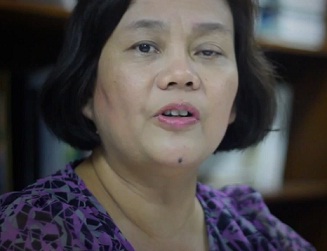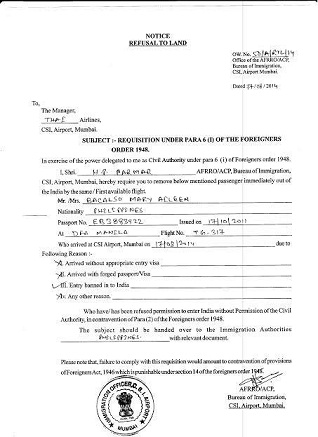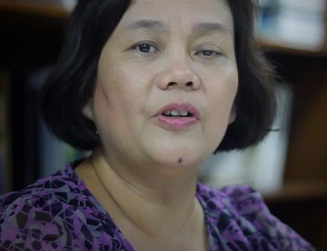 WHAT’S wrong with working for a world where no one becomes a desaparecido?
WHAT’S wrong with working for a world where no one becomes a desaparecido?
Apparently some people in India have a problem with that because Mary Aileen Diez Bacalso, secretary general of Asian Federation Against involuntary Disappearances (AFAD), was refused admission into India last Sunday and was sent back on the same Thai Airways plane which brought her to Mumbai.
Bacalso said when she asked why she was barred from entering India, an immigration official replied, “You should know.”
Bacalso is widely recognized for her work against forced disappearances. Last year she was awarded by the Argentinian government the Emilio Mignone International Human Rights Prize “in recognition of her work against enforced disappearance in Asia and the world. “
She is also the Focal Person of the International Coalition Against Enforced Disappearances with 52 members worldwide.
Her organization, AFAD, is a federation of human rights organizations working directly on the issue of involuntary disappearances in Asia. AFAD envisions a world without desaparecidos.
 Bacalso had been to India three times before in 2003, 2006 and 2009. She applied for a tourist visa from the Embassy of India in Manila on Aug. 11 for a trip scheduled on Aug. 17. Enough time for the Embassy’s usual five-day processing for tourist visas.
Bacalso had been to India three times before in 2003, 2006 and 2009. She applied for a tourist visa from the Embassy of India in Manila on Aug. 11 for a trip scheduled on Aug. 17. Enough time for the Embassy’s usual five-day processing for tourist visas.
Bacalso said while her papers were complete, her application was not accepted on the pretext that time was too short. She was told to get her visa upon arrival in Mumbai and she was allowed to board the plane.
Upon arriving at the Mumbai International Airport at 10 p.m., Aileen said she was immediately taken to a separate office, where around nine officials were present. “
“Without asking any questions and even before I could apply for visa on arrival, the officials started filling up a form, which I later came to know was the form for refusal to land. None of my questions or concerns was answered,” Bacalso related.
“Instead I was asked when the last time I visited India. I replied ‘November 2009.’ I was also asked so ‘what bad happened then’,” she further related.
Bacalso said her passport was returned to her only when she arrived in Manila.
In a statement, AFAD said, they “will report this blockade to the UN Working Group on Enforced or Involuntary Disappearances and to other Special Rapporteurs. AFAD urges the international human rights organizations and the institutions to question Indian government’s intransigence and their policy towards human rights work.”
AFAD said this is the second time that someone from AFAD has been stopped from entering India. In 2010, it said, an AFAD Administrative Officer was refused entry in India.
AFAD said “This ban on AFAD representatives to Jammu and Kashmir and India shows the deep paranoia and hostility of the Indian government towards human rights activists.
““It is pertinent to mention that Association of Parents of Disappeared Persons (APDP), a member organization of AFAD produced a report in December 2009 on unmarked graves and mass graves in Jammu and Kashmir, which later became a huge embarrassment for Indian State. In Jammu and Kashmir more than 8000 people have been subjected to enforced disappearances. So far according to the research of APDP, 7,000 unmarked graves and mass graves have been identified in Jammu and Kashmir.
“It appears that Indian State’s objective from this ban is also to isolate the human rights activists from Jammu and Kashmir. India, despite being the largest democracy has consistently behaved like a rigid anti-human rights country without any respect and concern to allow human rights groups to work unhindered in Jammu and Kashmir. “
It is indeed lamentable. Especially in India which is supposedly a showcase of a vibrant democracy in Asia.
